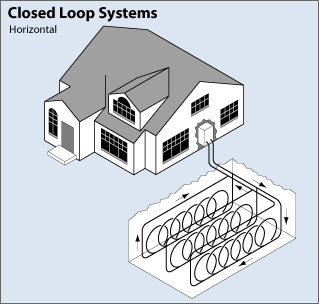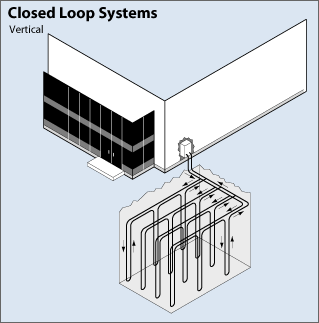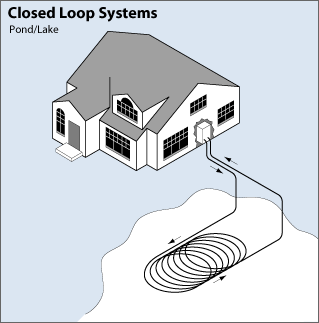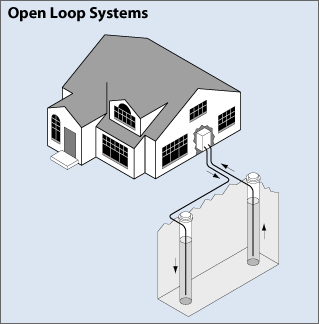|
There are four basic
types of ground loop systems. Three of
these—horizontal, vertical, and pond/lake—are
closed-loop systems. The fourth type of system is
the open-loop option. Which one of these is best
depends on the climate, soil conditions, available
land, and local installation costs at the site. All
of these approaches can be used for residential and
commercial building applications.
Closed-Loop Systems
Horizontal
This type of installation is generally most
cost-effective for residential installations,
particularly for new construction where sufficient
land is available. It requires trenches at least
four feet deep. The most common layouts either use
two pipes, one buried at six feet, and the other at
four feet, or two pipes placed side-by-side at five
feet in the ground in a two-foot wide trench. The
Slinky™ method of looping pipe allows more pipe in a
shorter trench, which cuts down on installation
costs and makes horizontal installation possible in
areas it would not be with conventional horizontal
applications.

Vertical
Large commercial buildings and schools often use
vertical systems because the land area required for
horizontal loops would be prohibitive. Vertical
loops are also used where the soil is too shallow
for trenching, and they minimize the disturbance to
existing landscaping. For a vertical system, holes
(approximately four inches in diameter) are drilled
about 20 feet apart and 100–400 feet deep. Into
these holes go two pipes that are connected at the
bottom with a U-bend to form a loop. The vertical
loops are connected with horizontal pipe (i.e.,
manifold), placed in trenches, and connected to the
heat pump in the building.

Pond/Lake
If the site has an adequate water body, this may be
the lowest cost option. A supply line pipe is run
underground from the building to the water and
coiled into circles at least eight feet under the
surface to prevent freezing. The coils should only
be placed in a water source that meets minimum
volume, depth, and quality criteria.

Open-Loop System
This type of system uses well or surface body water
as the heat exchange fluid that circulates directly
through the GHP system. Once it has circulated
through the system, the water returns to the ground
through the well, a recharge well, or surface
discharge. This option is obviously practical only
where there is an adequate supply of relatively
clean water, and all local codes and regulations
regarding groundwater discharge are met.

See how geothermal heat pumps work here!
(Please Note: Video may take approximately 1 minute
to load) |



